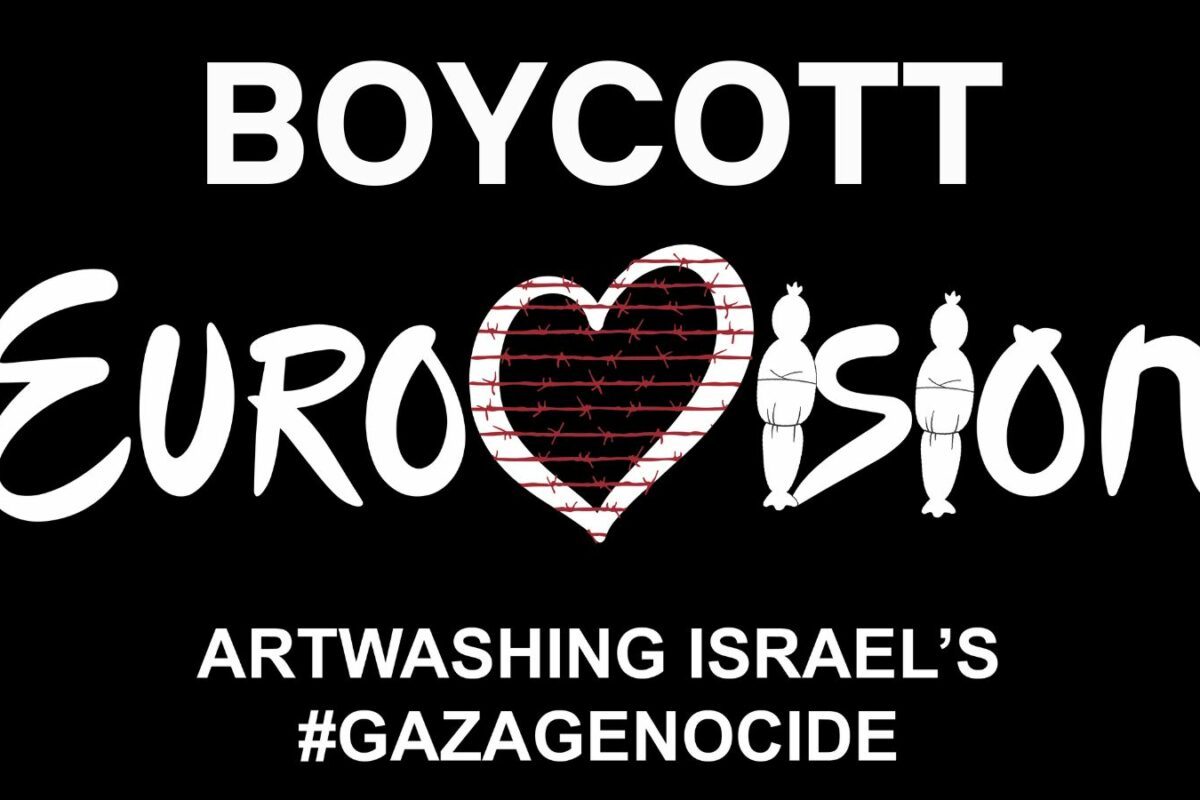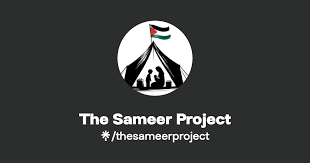Late one cold February evening in the Ligurian city of San Remo, a person in a hoodie and manatee-alien costume whispers in the ear of his fellow performer, an italian rapper named Ghali. They’re on a stage in front of 3000 audience members, a further 14 million people are watching at home. They have just performed for the last time this week. Ghali listens intently and repeats into the mic the short Italian phrase that we can all surely understand: “Stop al genocidio.”
This was the finale of Sanremo Music Festival 2024 (also known simply as Sanremo), the week- long, annual song contest on Italian television. Popular in its own right, it also serves as the selection event for Italy’s Eurovision song entry each year. After the finale, Ghali was accused of exploiting current events for attention by the Israeli ambassador to Italy but he would later confirm on Sunday variety show Domenica In that he has a history of supporting the Palestinian people that goes back further than October 2023 and has always been a political performer (he notably got in trouble for calling former interior minister Matteo Salvini a fascist). After Ghali left Domenica In, the host read a statement of “heartfelt and staunch” solidarity with “the people of Israel and the Jewish community” from Roberto Sergio, CEO of RAI (Italy’s national broadcaster). Shortly afterwards, pro-Palestinian protests erupted across sixteen Italian cities including violent repression from the police in Naples and protesters throwing glass bottles and smoke bombs at RAI’s regional offices in Milan, Ghali’s home town.
If you watch the Sanremo final on RAI’s online streaming service, Ghali’s protest has now been edited out.
This is an illustrative example of the tension building around the Eurovision Song Contest this year as people, artists, fans, NGOs and performers all call for Israel’s exclusion from the contest while national broadcasters, the event’s organisers and decision makers plug their ears and do their best to pretend everything is normal.
Peace Peace Love Love
Inspired directly by Sanremo Music Festival, Eurovision was founded in 1956, five years after Sanremo started, and has been held every year since, excepting 2020 (due to covid). While the competition has changed a lot since its early days, the basic concept has stayed the same. Simply put, roughly 40 countries submit an original song to be performed live on a big stage in May. Each country holds a public vote and a panel of industry experts who award points to all the other countries performing. You cannot vote for your own country.
This format and history resulted in the post-facto myth that Eurovision is a contest that exists to foster peace between the nations of post-war Europe. A similar myth is extended to other post-war institutions like the EU and NATO. People are very happy to believe this but in reality the first Eurovision was mostly a technical flex. Live television broadcasting was still a young technology in 1956 and the idea of broadcasting one show across multiple countries, simultaneously and on multiple channels was ambitious. It’s also incredibly cost effective. Despite the abundance of sequins, lasers and elaborate light shows for most broadcasters, Eurovision has a much lower cost per hour of television than your run-of-the mill soap opera.
While the idea of peace in Europe being sustained through a song competition, without which the region would descend into the Purge is amusing, it is worth noting that during the Eurovision’s 68 year run the continent has seen a great deal of violence. Turkey joined the contest one year after invading Cyprus. Azerbaijan participated in 2021 while Armenia was forced to withdraw for a year, because of the Second Nagorno-Karabakh war. Russia participated during the Russo-Georgian war and after the annexation of Crimea. Not to mention the invasions of countries outside of Europe partaken in by Eurovision members such as the invasions of Afghanistan and Iraq.
Despite Eurovision’s reputation as tacky, trivial and fundamentally unserious (propagated mostly by the British because they keep losing) it remains one of the most watched live television events in the world with ratings higher than the Superbowl. Live screenings in pubs and watch parties with friends are commonplace, even those who roll their eyes at the idea of it for 364 days of the year can end up watching the final on that one Saturday evening in May. Countries who take the competition seriously usually send songs that reach number 1 in their national charts. This is the competition that produced ABBA, Celine Dion and more recently Måneskin, musicians better known abroad than the competition that propelled them into the limelight.
As an authority on the subject (I’m a podcaster, you’re welcome) I do believe that Eurovision represents some of the best of modern Europe. Not because of lofty ideas of peace and love, because the Europe of classical architecture, old world sophistication, tradition and legacy never resonated with me. Eurovision’s bright lights, pageantry, fake tan and loud beats with A2 English lyrics remind me more of the Europe I grew up in; a Europe of underage drinking in front of your town’s rinky-dink fun fair with “Gigi D’Agostino”, for some reason, blaring in the background.
So Eurovision is a pretty big deal, but is it more important than solidarity with the Palestinian people?
No. Don’t be stupid.
The Disrepute Zone
Since I identify with the subsection of the population that starts thinking about Eurovision in January (and not, like, a week before it starts, as do normal people) I have been watching the European Broadcasting Union (Eurovision’s governing body) flounder as the issue of Israel grows ever-more awkward for them. They’ve relied on a handful of talking points to dismiss any criticism of Israel’s continued participation, outlined below.
1. Passing the Buck
The EBU originally claimed that it was not in a position to kick Israel out of the competition. While not technically true, the EBU is very much an organisation that draws its legitimacy from the national broadcasters that make up its membership. In 2022, after the invasion of Ukraine, the EBU publically stated that Russia could still take part ‘if it wanted to’ and only kicked them out after the national broadcasters of eastern Europe and the Netherlands threatened to withdraw from the competition. This gets even more farcical when you take the complaint that Israel should not participate to national broadcasters like SVT, RTL, RTÉ and BBC because they will then claim that it’s the EBU’s decision and theirs alone. This results in a lovely little feedback loop where no one has to take responsibility.
2. But it’s never been done!
We have two recent examples of countries being kicked from the competition, Russia and Belarus. Eurovision fans and pro-Palestinian activists are drawing comparisons between expelling Israel and the expulsion of Russia in 2022. The EBU’s official rationale for excluding Russia was, “Russia’s inclusion could bring the competition into disrepute” which is likely kept intentionally vague so as to not set the precedent that launching an invasion is grounds for kicking you out. The real difference between now and 2022 is institutional support. Support for kicking Israel out has come from fans, musicians, current and past Eurovision participants while support for kicking out Russia, while including a degree of public and artist support, came primarily from national broadcasters, and was in line with European government policies on isolating Russia. Without this official backing banning Israel from the contest is an uphill battle. All civilian death and international law violation comparisons between Israel and Russia, no matter how reasonable those comparisons are, get ignored.
The circumstances of Belarus’ suspension however, might serve as a more viable template for Israel’s suspension. One would think that Belarus got suspended along with Russia for supporting the invasion of Ukraine but they actually got suspended (for three years) in 2o21 for their national broadcaster, BTSC, violating EBU rules around impartiality and independence from their government. Activists have pointed to the manner in which the Israeli national broadcaster, KAN, has covered the actions of the IDF in Gaza, as grounds for their exclusion from the EBU and thus Eurovision. While there’s a fair amount of evidence to support this assertion, for those seeking justice for the Palestinian people it does feel akin to getting Al Capone for tax evasion.
It’s all Political
Some more erudite Eurovision fans might feel compelled to bring up the Eurovision’s “no politics” rule. To which I say (like a complete asshole): what are politics? Okay, sure, it seems like an obtuse question but I swear it’s relevant. In reality, the “no politics” rule is a joke. The EBU can point to a handful of examples indicating they take it seriously (such as Georgia’s banned post-Russo-Georgian war entry entitled “We Don’t Wanna Put In” ) but the EBU has always had a limited definition of politics and for what it does consider political is hazy enough for plausible deniability with exploitable loopholes.
In general, if the EBU considers something morally good, it’s not political. Obviously this will include songs about peace, stopping war (vaguely defined) or in a more specific case, the two songs submitted in 1990 that referred to the fall of the Berlin wall.
The EBU also does not consider the personal political. Ukraine won in 2016 with Jamala’s “1944” a half-English, half-Crimean Tatar song about the deportation of Crimean Tatars in the 1940s. The lyrics are vague but do not explicitly refer to modern Crimea, although Jamala noted that 1944 is not only about the past. Since Jamala’s great-grandmother was deported in the 1940s, her song was allowed to participate because the song’ was personal.
There also seems to be an unwritten “just don’t be obvious” rule, which Georgia’s 2009 entry was in violation of, however, you can push the rule pretty far if you want, such as Armenia’s 2015 entry “Face the Shadow.” You have to be someone who’s just heard of Armenia to not understand what six Armenians on stage singing a chorus of “don’t deny” over and over is in reference to. They were allowed to participate after, upon the EBU’s request, changing the name of the song from “Don’t Deny.”
I haven’t even mentioned Eurovision’s relationship to LGBT+ visibility and rights, which could be its own article. The 1961 winner, Luxembourg’s “Nous Les Amoureux” was a song about two lovers whose love was threatened, after the singer, Jean-Clause Pascal, came out he confirmed that the song was about two men. The lyrics manage to not reference the gender of the lovers, a remarkable feat in 1960s French. More recently, Finland’s 2013 entry “Marry Me,” was read as a protest song in favour of the legalisation of same-sex marriage (which Finland would legalise in 2017). It was fun watching people at home slowly realise that the woman singing the imperative “marry me” of the chorus was not directed at a man but at the state.
In recent years we’ve seen the number of political entries incease, Croatia’s absurdist anti-Putin entry “Mama ŠČ”, the Czech Republic’s pro Ukraine sovereignty song “My Sister’s Crown” and my personal favourite, Serbia’s “In Corpore Sano” about how musicians as freelancers are excluded from public health insurance options, including the singer’s former bandmate who died of a treatable form of cancer. The line “God grant us health, because I don’t have insurance” gets me everytime. The atmosphere this year is no different. Second place in Ireland’s national selection was song about not being able to speak Irish anymore, Croatia’s entry this year is a Eastern European brain-drain anthem and Ghali’s song “Casa Mia” with it’s lyrics about greener grass, bluer skies and bombed hospitals is a bit on the nose. Even if Israel is kicked out or withdrawn, we’re likely to see Israeli-Luxembourgish entry Tali Golergant act as proxy (she dedicated her victory in Luxembourg to her brother currently in the IDF) and the participation of Palestinian musician Bashur Mahmud in Iceland’s national final was campaigned against.
This is just the performers and songs, the contest itself has always been political. The EBU along with the hosting national broadcaster have organised performances that occur while votes are being tallied. These range from drag acts to performances from past winners but have also included dance routines depicting the plight of refugees and the trauma inflicted upon the recent wave of refugees from the invasion of Ukraine.
What’s being done about it
The EBU’s insistence that Israel participate is already causing small acts of protest. Ghali’s comments at Sanremo were not the only ones at the final. Another finalist, Dargen D’Amico, called for a ceasefire after his performance. This comment was also subsequently censored on RAI’s streaming version. A person rushed the stage of Norway’s national selection show, Melodi Grand Prix, on live Norwegian television with a Palestinian flag and t-shirt reading ‘‘boycott Israel.’’ We’re likely to see these small acts of protest continue in May. There’s already been reports of heightened security for the Eurovision final directly attributed to ‘‘events in the Middle East’’ and because this year’s host city, Malmo, is considered a pro-Palestinian city in Sweden.
Potential performers have claimed they will not attend if Israel is allowed to participate or will lobby the EBU to kick them out. Former participants and thousands of musicians from Finland, Iceland and Sweden have called for Israel to be excluded. Boycott Divestment and Sanctions (BDS) called for the expulsion of Israel. When that failed, March 2nd they called for a boycott of the song competition. Eurovision journalists have either intentionally limited their coverage of Israel in Eurovision 2024 or have dealt with the EBU’s hypocrisy head on (and received death threats). Letter writing campaigns have been directed at national broadcasters, the EBU, the performers and sponsors (you can find the details here if you are interested). Alternative, boycott-friendly watch parties are being organised (including this one in Berlin organised by myself which will be fundraising for Medical Aid Palestine).
It is impossible to keep politics out of this contest. Banning Russia was a political move and the shows of sympathy and support to Ukraine by performers and even the contest organisers themselves was a political act—an act that, as far as I can tell, has been appreciated by viewers and fans. However, if Russia can get banned for an invasion, Belarus can get banned for media repression, but Israel can remain, the EBU is sending a pretty clear signal that Palestinian lives don’t matter.




